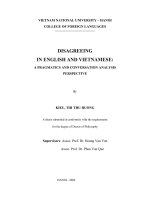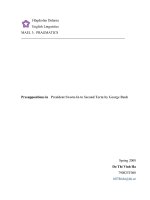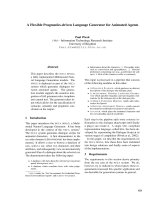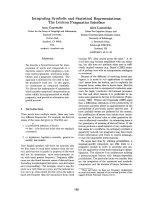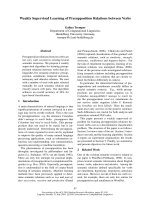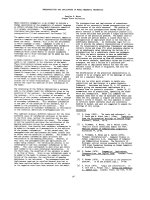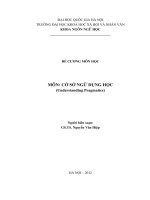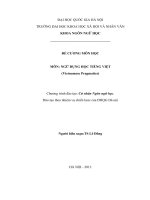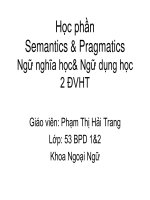PRESUPPOSITION (Pragmatics)
Bạn đang xem bản rút gọn của tài liệu. Xem và tải ngay bản đầy đủ của tài liệu tại đây (28.66 MB, 39 trang )
Presupposition
DEFINITION and CHARACTERISTICS
Definition: Presupposition is
“ what a speaker or writer assumes that the
receiver of the message already knows”
1. Would you like some more cake?
2. Mary doesn’t study English anymore.
CHARACTERISTICS
1.The presupposition of an utterance
remains the same under its NEGATION:
a.“I like Peter’s laptop.”
b.“I don’t like Peter’s laptop.”
Peter has a laptop.
2. The presupposition of an
utterance remains the same
under its INTERROGATION:
a.“John stopped smoking.”
b. “Did John stop smoking.?”
c. “Why did John stop smoking?”
All presuppose that John once
sm oked cigarettes.
The presupposition of an
utterance may becancelled
under its EXTENSION:
a.“She didn’t feel regret at the
over-cooked meat.”
3.
the m eat w as overcooked
b. “ She didn’t feel regret at the
over-cooked meat because it
was in fact well-done”
the m eat w as w ell-done.
6 types:
Existential presupposition
Lexical presupposition
Structural presupposition
Factive presupposition
Non-factive presupposition
Counter-factual presupposition
Existential presupposition
Appear in:
_ possessive noun phrase
Ex: 1. They haven’t spoken to each other since
their last week’s quarrel.
They had a quarrel last week.
2. John lost his w atch yesterday at Ben Thanh
market.
He had a w atch
The speaker and hearer know who John is
=> a complete statement: X had/has/will have
+an indefinite NP
_ definite noun phrase
Ex: 1. The K ing of Sw eden has just left
for France.
There is/ exists a king in Sweden
The king of Sweden exists
2. Children like all the picture in this
book very much.
There are/exists a number of pictures in
this book.
A number of pictures can be found in
this book.
3. The American girl next door is having a party.
There is an American girl next door
There is a girl from the USA living next door.
• A definite NP=> a complete statement
• There be(not) + an indefinite NP+ adjunction of
place
• There exist/exists/existed + an indefinite NP+
adjunction of place
Lexical presupposition
The use of one form with its asserted
meaning is conventionally interpreted with
the presupposition that another (nonasserted) meaning is understood.
Based on words, one meaning can be
understood by another meaning with the
presupposition.
Ex:
• You are late again.
you were late before
• Jim wants more popcorn.
Jim has eaten some popcorn
• He stopped smoking.
He used to smoke/ he once
smoked.
• Can you stop making that noise?
there is some noise and you are
making it
You are making that noise.
• I’m not going to let him come under my roof
anymore
->He often comes under my roof/ to my house
I’m going to change job.
-> I have a job already.
I’ve just got a driving license
->I had no driving license before
->I did not have license before
We started complaining.
They had never complained before
•
•
•
•She managed/didn’t manage to pay her debt.
She tried to pay her debt.
She owed a debt and she tried to pay it.
Structural presupposition
Certain structures have been analyzed as
presupposing that part of structures is already
assumed to be true.
Structures:
_ Wh – question
_ Wh – clause
Ex:
* Where did you buy the car?
you bought a car
* How long has your grandfather been in
hospital ?
your grandfather has been in hospital
* I was eating ice-cream when Tom
repaired the television set.
Tom repaired the television set
…..
* I wonder how he managed to get the
job.
he managed to get a job
• When did he leave?
-> He left.
• What do you usually do in your free time?
-> You have some free time and that you do ST at
leisure.
-> A Where-question=> a complete statement
-> A Wh-embedded clause => a complete statement
Factive presupposition
The presupposed information following a
particular expression can be treated as a
fact.
Particular verbs and expression:
• realize, regret
• be aware, be glad, be odd
Ex:
Nobody realized that Kelly was ill.
Kelly was ill
He wasn’t aware that she was married.
she was married
We regret telling him the truth.
we told him the truth
I am glad that it’s over.
it is over
Non-factive
presupposition
Be assumed not to be true
Be fictional / illusory
Particular verbs: dream, image, pretend
Ex:
I imagined that Kelly was ill.
Kelly was not ill
He dreamed that he was rich.
he was not rich
She pretended that he had understood
what she meant.
he did not understand what she meant
Counter-factual presupposition
Be opposite of what is true
Be contrary to facts
Particular expression:
• If-clause
• Wish
• Modal perfective verbal forms
(might/should/could + have + PP)
Ex:
If you were my friend, you’d have helped me.
you are not my friend
If I had had enough money, I would have bought that
house.
I did not have enough money
They wish they could go on vacation now.
they cannot go on vacation now
Jim shouldn’t have seen such a horror film.
Jim did see/saw a horror film
1. If I had enough money, I would buy that house.
-> I do not have enough money.
2. If I had had enough money, I would have bought
that house.
-> I did not have enough money.
3. They wish they could go on vacation now.
-> They cannot go on vacation now.
4. I wish I had studied medicine
-> I did not study medicine.
1. You shouldn’t have seen such a horror film.
-> you did see/ saw a horror film
2. You could have talked to the dean.
-> you did not talk to the dean
* An if clause => a complete statement
* An embedded clause after “wish”=> a complete
statement
* A clause with a modal perfect verb form => a
complete statement
Exercise : Identify the presupposition(s) in each of the following sentences.
1. ‘I am sorry I cannot find your book right now.’
The utterance presupposes that...
2. ‘On the occasion of my friend's birthday, I intend to buy her a new vase.’
The utterance presupposes that….
3. ‘The exam is not so difficult.’
The utterance presupposes that......
